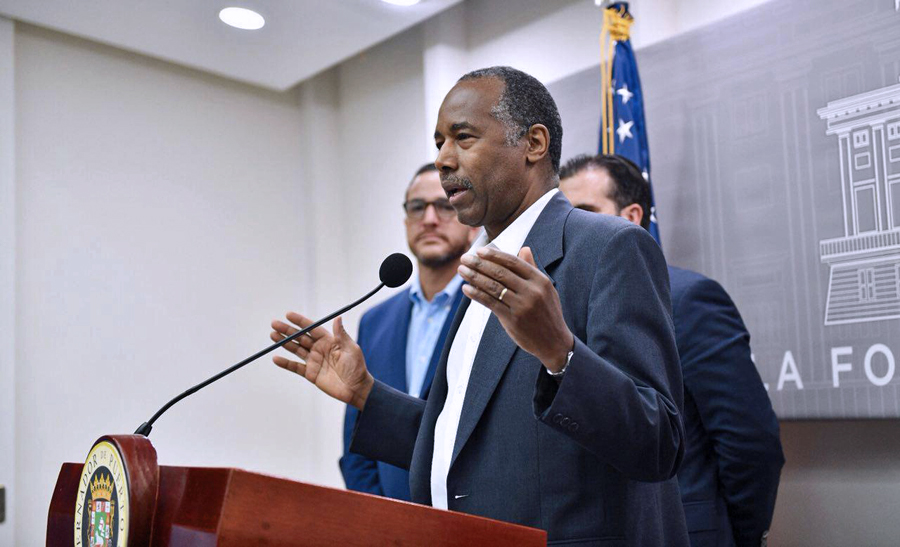Housing and Urban Development, P.R. ink $1.5B disaster recovery grant agreement

U.S. Department of Housing and Urban Development Secretary Ben Carson and Gov. Ricardo Rosselló announced the formal execution of a $1.5 billion grant agreement to help citizens in Puerto Rico to recover from Hurricanes Irma and María.
The signing of the grant agreement now paves the way to speed recovery dollars needed to restore damaged and destroyed homes, businesses and infrastructure, they said during a news conference at La Fortaleza.
Puerto Rico’s long-term recovery is supported through HUD’s Community Development Block Grant—Disaster Recovery (CDBG-DR) Program, which requires grantees to develop “thoughtful recovery plans informed by local residents.”
“Today, HUD and Puerto Rico are moving forward to speed recovery on the island,” said Carson. “Now that we have a framework in place, implementing Puerto Rico’s disaster recovery program can move full steam ahead.”
“We’re grateful for the great working relationship we have established with the Department of Housing and Urban Development and for their continuous consideration in terms of the housing, infrastructure, and economic revitalization needs of the American citizens living in Puerto Rico,” said Rosselló.
“The island continues to recover from the passage of hurricanes Irma and María, but with the trust and support of HUD we will definitely rebuild better and stronger than ever,” he added.
To address unmet needs, Puerto Rico identified several housing, infrastructure and economic development recovery needs arising from Hurricanes Irma and María. Puerto Rico’s disaster recovery action plan includes the following activities:
- Housing ($1 billion)– Puerto Rico is investing more than $1 billion to restore the island’s severely damaged housing stock. As part of the plan, Puerto Rico intends to provide up to $120,000 to rebuild destroyed homes for each qualified homeowner and up to $48,000 to repair each eligible damaged property. Additional housing investments include funding for rental assistance ($10 million), specifically for properties serving the elderly and other vulnerable households. Puerto Rico has also proposed a $36 million Home Emergency Resilience Program that provides up to $6,000 per household for individual solar appliances to help families.
- Economic revitalization ($145 million) – Puerto Rico’s recovery plan provides $145 million for several activities to help revitalize the post-disaster economy, grants of up to $50,000 for eligible businesses. The plan also targets grants of up to small business incubators and accelerators ($10 million) awards of up to $2.5 million for each eligible incubator operation, a workforce training program ($10 million) awards of up to $2 million to train eligible Section 3 residents, and a construction and commercial revolving loan program ($35 million) that will provide up to $1 million per loan to eligible businesses.
- Infrastructure ($100 million) – To support the repair of damaged infrastructure on the island, Puerto Rico intends to target $100 million to match federal investments through the Federal Emergency Management Agency’s Public Assistance and Hazard Mitigation Grant Program projects.
The Additional Supplemental Appropriations for Disaster Relief Requirements Act, 2017 was signed in September 2017, appropriating $7.4 billion in CDBG-DR funding for major disasters declared that year.
To distribute the funds, the Act requires HUD to direct the funds to the areas most impacted by last year’s major disasters. On Feb. 1, 2018, HUD allocated $1.5 billion of that appropriation to Puerto Rico to address the serious unmet needs on the island. The action plan approved Thursday will put these funds to work, government officials said.
On April 10, 2018, HUD allocated another $18.5 billion to further support recovery in Puerto Rico and to rebuild communities impacted by Hurricanes Irma and María “and to protect them from major disasters in the future.”
HUD will soon publish program rules to guide Puerto Rico and others on the use of those funds, officials said.
CDBG-DR grants support a variety of disaster recovery activities including housing redevelopment and rebuilding, business assistance, economic revitalization, and infrastructure repair. Grantees are required to spend the majority of these recovery funds in “most impacted” areas as identified by HUD. HUD will issue administrative guidelines shortly for use of the funds to address grantees’ long-term recovery needs, particularly in the area of housing recovery.













